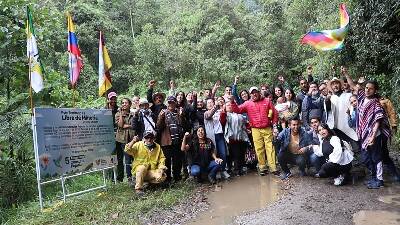Corporations must be held accountable for human rights and environmental crimes
Transnational corporations and companies controlling value chains generally enjoy impunity from liability and prosecution for human rights abuses, often linked to land grabbing and pollution. On Monday, states will meet in the UN Human Rights Council in Geneva for a week to continue longstanding negotiations on a legally binding treaty to hold them accountable.
Attempts by some states to water down human rights standards must not be allowed to succeed when the eighth session of the Open-ended Intergovernmental Working Group on Transnational Corporations and Other Business Enterprises with Respect to Human Rights meets.
FIAN International stands in solidarity with hundreds of social movements and civil-society organizations and social movements around the world urgently calling for a treaty with the teeth to protect peasants, small-scale farmers, indigenous peoples, women, fishers, agricultural workers and communities who are at the receiving end of corporate abuse and harm.
“There are too many gaps in international law which allow for the impunity of corporations that have caused or contributed to human rights loss and damage,” says FIAN International’s Permanent Representative to the UN, Ana María Suárez Franco.
“After eight years of talks, governments must now stand firmly on the side of affected communities and advance the negotiations, considering the urgent need for global solutions.”
No binding global legal framework exists to regulate the activities and value chains of transnational mining companies, agribusiness and other businesses with atrocious human rights records. This lack of a level playing field allows unscrupulous companies to escape justice by jumping from one jurisdiction to another. Companies often exploit situations where there are weaker legal protections and argue that they are not breaking any law when they force people off their land, destroy their environment and livelihoods and even cause loss of life.
Voluntary guidelines like the UN Guiding Principles on Business and Human Rights and national legislation like the French law on the duty of vigilance of transnational corporations are not enough to protect communities and the environment from unscrupulous corporations. Many states are beginning to recognize the need for binding rules at a global level.
As demonstrated in several recent cases – such as the Brumadinho Dam Disaster in Brazil, industrial and resource-related land grabs in India and Colombia and threats to small farmers’ livelihoods in Zambia from agribusiness – a robust set of binding rules are needed to ensure peoples human rights are prioritized over economic interests.
“An international treaty on transnational corporations and other businesses is essential to govern globalized economies,” says Ayushi Kalyan, FIAN International’s Corporate Accountability Coordinator.
“A level legal playing field would fill the gaps in protection, allow people better access to justice, and hold companies liable for their human rights and environmental impacts.”
Watered down proposals
Several attempts are being made to curb political agreements towards realizing a solid treaty. Informal proposals shared ahead of next week’s talks have watered down several key human rights standards and norms making redundant the negotiating progress achieved in recent years. These propose completely new narratives and neglect several major contributions from many states.
“The margin of discretion allowed to states in the proposals, makes it impossible to achieve a global level playing field for the regulation of transnational corporations and other enterprises in international law,” says Ayushi Kalyan.
“This diverts us from our goal to set a common regulatory standard globally at a time when we more than ever need binding rules that hold businesses and corporations accountable for human rights violations.”
A recently published study assessing complementarity between the UN treaty and a proposed EU directive on corporate sustainability due diligence shows that even if national and regional due diligence legislations are important, they are not enough. While due diligence legislation departs from a company point of view the TNC treaty prioritizes people and the planet and focuses on prevention, liability, access to remedy and cooperation, including in conflict affected areas, thereby closing gaps in protection and regulation.
Corporate interests, or states intent on defending them at the expense of people, must not be allowed to hijack the Open-ended Intergovernmental Working Group on Transnational Corporations and Other Business Enterprises with Respect to Human Rights as has happened in the past with similar initiatives.
For more information contact Ana María Suárez-Franco: Suarez-Franco@fian.org
Read more on FIAN's view of the treaty negotiations in this op-ed published by the Business and Human Rights Resource Centre
Concerned by excessive emphasis on voluntary standards, corporate capture and proliferation of multistakeholder spaces allowing businesses as stakeholders in human rights discussions, FIAN International and its sections also published a position paper on business due diligence and related States’ obligations in the context of corporate accountability.






